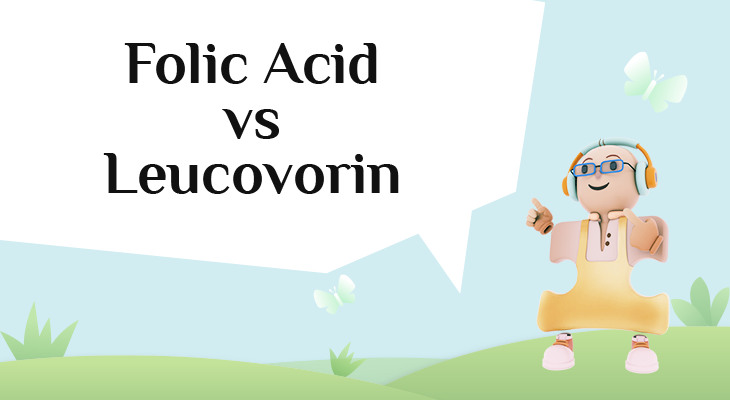
Folate, Folic Acid, and L-Methylfolate for Pregnancy Nutrition
In many instances we have heard the terms Vitamin B9, folate, folic acid, and
l-methylfolate. All of this can be quite confusing for so many of us. It is important to understand that there are differences in the nomenclature of each and there are distinct properties for each that are important in overall nutrition and reproduction.
The term folate is generally used as a generic name for the group of chemically related compounds based on the folic acid structure. Folate, also known as vitamin B9, is thought of as one of the 13 essential vitamins. It cannot be synthesized de novo by the body and must be obtained either from diet or external supplementation. Dietary folate is a naturally occurring nutrient found in foods such as leafy green vegetables, legumes, eggs, liver, and various citrus fruit. Folic acid, however, is a synthetic dietary supplement that is present in artificially enriched foods and pharmaceutical vitamins. In fact, by government mandate a variety of foods in the US are fortified with folic acid, in an effort to prevent neural tube defects. Neither folate nor folic acid is metabolically active. Both must be reduced to participate in cellular metabolism. L-5-Methyltetrahydrofolate, otherwise known as l-methylfolte, is the predominant micronutrient form of folate that circulates in plasma and that is involved in numerous biologic processes.
Folate (vitamin B9) is a critical nutrient that is required for DNA replication and as a substrate for a range of enzymatic reactions involved in amino acid synthesis and vitamin metabolism. Demands for folate increase drastically during pregnancy because it is required for growth and development of the fetus. Folate deficiency has been associated with abnormalities in both mothers and fetuses.
Dietary supplementation with folic acid around the time of conception has long been known to reduce the risk of neural tube defects (NTDs) in the offspring. Again, this was the impetus for folic acid food fortification.
Folate (Vitamin B9) is crucial during pregnancy for several reasons:
- Neural Tube Development: Folate plays a vital role in the early development of the neural tube, which eventually forms the baby’s brain and spinal cord. Adequate folate intake significantly reduces the risk of neural tube defects such as spina bifida and anencephaly.
- DNA Synthesis and Cell Division: Folate is essential for DNA synthesis and cell division. During pregnancy, there is rapid cell division and growth, especially in the developing fetus. Adequate folate levels support healthy cell development and growth for both the baby and the mother.
- Red Blood Cell Formation: Folate is necessary for the production of red blood cells. During pregnancy, the mother’s blood volume increases to support the growing fetus. Sufficient folate intake helps prevent anemia, which is common during pregnancy and can lead to fatigue and other complications.
- Prevention of Other Birth Defects: In addition to neural tube defects, folate may also help prevent other birth defects, such as cleft lip and palate and certain heart defects.
For a pregnant woman, folate is certainly important. Beyond actual consumption, however, folate needs to become metabolically active. Folate/folic acid are not active and must be converted via several steps and mechanisms. To become metabolically active, folic acid must first be converted to dihydrofolate (DHF) and then tetrahydrofolate (THF) through enzymatic reduction, a process catalyzed by the enzyme DHF reductase (DHFR). Thereafter, THF can be converted to the biologically active l-methylfolate by the enzyme methylenetetrahydrofolate reductase (MTHFR). This important conversion is necessary to provide l-methylfolate for the one-carbon transfer reactions (methyl donations) needed for purine/pyrimidine synthesis during DNA and RNA assembly, for DNA methylation, and to regulate homocysteine metabolism.
MTHFR is the critical enzyme for almost all biologic processes that involve the metabolism of folate and methionine. Sometimes, however, there are certain genetic polymorphisms that may alter the efficacy of MTHFR. Interestingly, in the US it is estimated that approximately 60% of the population are intermediate metabolizers of folate or heterozygous for genetic polymorphism of the MTHFR enzyme, whereas up to 25% of certain populations are homozygous for these genetic variations. In varying degrees, these polymorphisms impair the conversion of folate to its active form,
l-methylfolate. Based on the high prevalence of MTHFR genetic polymorphisms in the general population and concerns about reduced enzymatic activity and, therefore, less biologically available l-methylfolate, newer research in this area has focused on supplementation with l-methylfolate rather than folic acid as a means of preventing folate-related pathology.
Another recent discovery with respect to folate and pregnancy has been the discovery of folate receptor autoantibodies. In these instances, the presence of folate receptor autoantibodies impedes the proper transport of folate into the cell. Folate receptor autoantibodies target the folate receptor alpha, which is one of main transporters of folate and render it dysfunctional. In other words, these autoantibodies attack this receptor and hinder efficient folate transport. Because of this, proper folate transport may not occur resulting in possible complications during pregnancy and affecting the growth of the fetus. Further research into this is certainly warranted. FRAT®, a simple blood test, screens for these folate receptor autoantibodies. Please consult your physician for further information.



